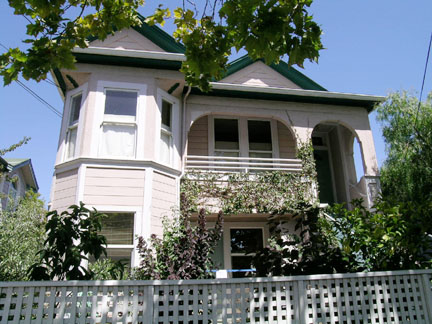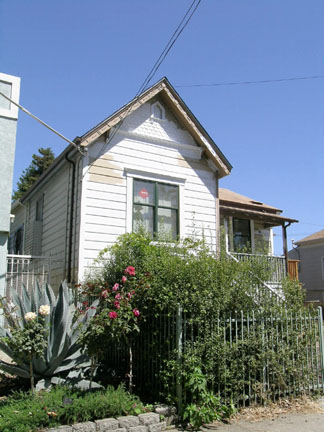The Curious Case of Honora Townsend Bentley
This Italianate Victorian at 2109 Fifth St. was built in 1877 by Chilean tanner Juan Velasco and acquired by Honora Townsend in 1886. (photo: Daniella Thompson, 2008)4 August 2008
On 30 April 1906, Chief of Police August Vollmer observed an aged woman receiving supplies at the YMCA headquarters, where refugees of the San Francisco earthquake and fire were given food and clothing. Vollmer identified her as Honora Bentley, a well-to-do West Berkeley property owner who lived in apparent poverty at 2439 Ninth Street.
For years, Mrs. Bentley’s neighbors believed her to be poor, until a series of bizarre lawsuits and countersuits, beginning in August 1904 and extensively covered in the press, revealed her to be the owner of a considerable estate, rumored to be worth $60,000. Consequently, even before she was arrested by Vollmer, Honora Bentley was a well-known character, whom newspaper accounts described as notorious and eccentric. The news of her arrest spread far and wide through the Associated Press.
San Francisco Call, 1 May 1906Mrs. Bentley was taken into custody, charged with obtaining goods under false pretenses, and brought before Justice of the Peace Robert Edgar, who ordered her held on $1,000 bail. She spent three days in the county jail, until bail (a mere $100, according to the San Francisco Call) was posted on 3 May. Coming up for trial on 25 June, the case took a new turn. Represented by attorney Frank L. Rawson, Mrs. Bentley entered a plea of not guilty and demanded a jury trial.
Rawson claimed that his client had not been identified as the woman who obtained the goods from the relief committee and asked that the case be dismissed for lack of evidence. Prosecutor Hugh Goodfellow agreed, since Miss Barr of the relief committee could not positively identify Mrs. Bentley as the woman to whom she gave clothes. The case was dismissed.
Oakland Tribune, 26 June 1906Precious little is known about the long life of Honora Bentley, but no doubt it was a life beset with hardship and pain. It may have been the Irish famine that brought her to America. She lost her first husband while still in her thirties, bore ten children, raised most of them by herself, and outlived all but a few. Yet somehow she managed to become a woman of means.
Long before she became Mrs. Bentley, Honora was Mrs. Townsend. Born in 1830 in Northern Ireland, she came to America in 1852. Her marriage to Edward Townsend, an English-born laborer her age, may have taken place in the New World. By 1853, the couple was living in California and bringing their first child into the world. The 1860 federal census found them in San Francisco with four daughters aged 7 to 2 and real estate valued at $500. Ten years later, Edward apparently dead, Honora had at home five children aged 18 to 2, and the value of her real estate had climbed to $10,000.
The Niehaus Brothers’ West Berkeley Planing Mill. Edward F. Niehaus lived on Block 106 of the Sisterna Tract during the 1880s.In 1886, Honora made her first Berkeley investment, purchasing lots 22, 23, and 24 in Block 106 of the Sisterna Tract, along Fifth Street between Addison Street and Allston Way. At the time, there were only three houses on the block. The most valuable, built in 1879 on Sixth Street, 150 feet north of Allston Way, belonged to lumberman Edward F. Niehaus, co-proprietor of the West Berkeley Planing Mill. On Allston Way lived laborer Hans Holgerson and his wife Ann, in a modest home built by the Sisternas in 1881. The oldest house on the block belonged to the Chilean tanner Juan Velasco, who built it on lot 24 in 1877. This Italianate house became the property of Honora Townsend, along with the two adjacent lots she purchased in 1886. It survives at 2109 Fifth Street.
Mrs. Townsend did not move to Berkeley immediately. In 1889, she was listed in the San Francisco directory as a widow living at 2118 Jones Street. By then, all her children had reached majority and either left home or were close to doing so. Honora was absent from the 1890 San Francisco directory, indicating that she may have moved to Berkeley in that year. It is certain that she wasted no time in increasing her West Berkeley holdings. By 1892, when she made her first appearance in the Berkeley directory, she had built two additional houses nearby. One, in the Queen Anne style, went up on lot 22 and still stands at 2117 Fifth Street. The other, considerably more expensive and long since demolished, was constructed on the west side of Sixth Street between University Avenue and Bristol Street (now Hearst Avenue).
The Queen Anne at 2117 Fifth St., built by Honora Townsend in the early 1890s, was clad in stucco when occupied by an Italian cement worker in the 1920s. (photo: Daniella Thompson, 2008)Around 1896, Honora married one Henry Bentley, who came to live with her at 2117 Fifth Street. Three years later, the couple switched their residence to a modest cottage at 2439 Ninth Street, yielding the Fifth Street home to Honora’s daughter Emma Kidd (born c. 1862) and her husband William, a stevedore. The Ninth Street cottage had been built in 1891 by Charles A. Bailey, one of the largest landowners in Berkeley (in 1889 Bailey was the third wealthiest individual taxpayer in Berkeley, surpassed only by James McGee and Francis K. Shattuck).
Honora’s marriage to Bentley was short-lived as her husband, doubtlessly at least as old as she was, died soon after the move. The 1900 U.S. census found Honora a 69-year-old widow, living alone on Ninth Street, six of her ten children dead. She apparently found solitary living difficult, for soon enough she invited a man to live with her. He was James Fitzpatrick, an octogenarian who listed his profession as engineer in the 1903 city directory, where he was listed for the first time as resident at 2439 Ninth Street.
Fitzpatrick apparently did some odd jobs for Honora, including rent collection. Their relationship soured in the spring of 1904, when Fitzpatrick described himself as Mrs. Bentley’s contract husband. When this claim reached Honora’s ears, she moved back to 2117 Fifth Street and ordered him out of the Ninth Street house. In retaliation, he brought suit against her to recover $1,200 on an alleged promissory note and an additional $750 for services rendered. On 23 August, Mrs. Bentley was in court to state that the note was a fraud (she had once signed what she thought was a receipt for $12 so that Fitzpatrick could collect some rent for her) and that he had been paid in full for all his services before she left him.
The modest Victorian cottage at 2439 Ninth St., currently undergoing expansion and renovation, was the object of property disputes between Honora Townsend Bentley and James Fitzpatrick. (photo: Daniella Thompson, 2008)Fitzpatrick then laid claim to the Ninth Street house, and in the fall of 1904, Mrs. Bentley headed him off by deeding all her West Berkeley properties to her daughter, Margaret Curtis (born c. 1860), and to her attorney, David Mitchell, as tenants in common. Fitzpatrick made the next move, procuring from her by force a signed document clearing himself and defaming attorney Mitchell. “There are many sensational features in connection with this litigation which may be revealed in court, but not elsewhere,” the Oakland Tribune quoted Mitchell as saying, “Mrs. Bentley tells me that in the last week she attempted three times to secure a warrant for Fitzpatrick’s arrest in Judge Quinn’s court in connection with this latest attack upon her but that each time Fitzpatrick has intercepted her.”
Mitchell further claimed that he had letters showing that Fitzpatrick had been trying to ingratiate himself with Mrs. Lund, an aged and wealthy Berkeley woman. This move apparently prompted some negotiations, and on 20 October 1904, the couple appeared together before Judge Edgar, Fitzpatrick announcing that they had resolved their differences. Honora said nothing. Her troubles were just beginning.
In September 1905, Honora was sued by house mover William P. Grant for $229.80. In response, she asserted that she had authorized him to make repairs for $100, that “he has twisted the house and wrenched it so badly that the roof leaks and it is uninhabitable,” that he had not completed the work, all of which was not worth more than $150, that she had offered to pay him $150 but he had refused.
Less than three months later, attorney David Mitchell was arrested for sexually assaulting a 14-year-old girl he had lured into his office. Honora promptly hired attorney Frank L. Rawson and accused Mitchell of having embezzled from her $2,500 in cash and $10,000 in real estate, leaving her destitute. Rawson announced he would take steps to prevent Mitchell from using her property to secure his release on the assault charge.
San Francisco Call, 1 December 1905Within two weeks, Honora’s daughter Emma was arrested for throwing sticks and stones through the front-room windows of their neighbors, the Welch family of 2111 Fifth Street, and verbally abusing their teenage daughter. Emma pleaded guilty before Judge Edgar and, apparently unable to pay a fine, was sentenced to ten days in the county jail.
Fitzpatrick meanwhile holed himself up at 2439 Ninth St. and posted a warning on the door: “There is a mesheen behind this doare to kill aney on opening the saim. Trifel not and keep out of here for the present. Don’t trifel with this doare.” From his jail cell, Mitchell waged war with Fitzpatrick over ownership of the property. Their wrangle was soon rendered immaterial. Judge Harris ordered Fitzpatrick ejected from the property, and the Sheriff’s deputies removed his belongings to the street. On 11 January 1906, Rawson filed deeds conveying all the properties back to Mrs. Bentley. The same day, Fitzpatrick returned to the house and applied a match in several places, but neighbors who had seen him leave extinguished the flames. Charged with arson, Fitzpatrick was confined in a cell adjoining Mitchell’s, and the two frequently engaged in abusive disputes.
Mitchell was found guilty of the assault charge and sentenced in July 1906 to six years at San Quentin, but two retrials kept him in the county jail until December 1907, when he was released on insufficient evidence. During his two years in jail, he had become an expert cook.
San Francisco Call, 9 July 1910Honora Townsend Bentley died in 1910, leaving property worth $20,000. After her death, her house at 2439 Ninth Street was occupied by the Kidds and Margaret Curtis. William Kidd was still working as a stevedore, while Margaret was listed as a seamstress in that year’s census record. Although living under one roof, the two sisters were not in accord. In July, Emma secured a citation ordering Margaret to appear in the probate court and explain why, as administratrix of the estate, she refused to hand over $5,000 left to Emma in the will.
The sisters soon disappeared from Berkeley. Only the three Victorian houses in West Berkeley stand as a reminder of the notorious Honora Townsend Bentley.
This article was published in the Berkeley Daily Planet on 7 August 2008.
Copyright © 2008–2022 Daniella Thompson. All rights reserved.









